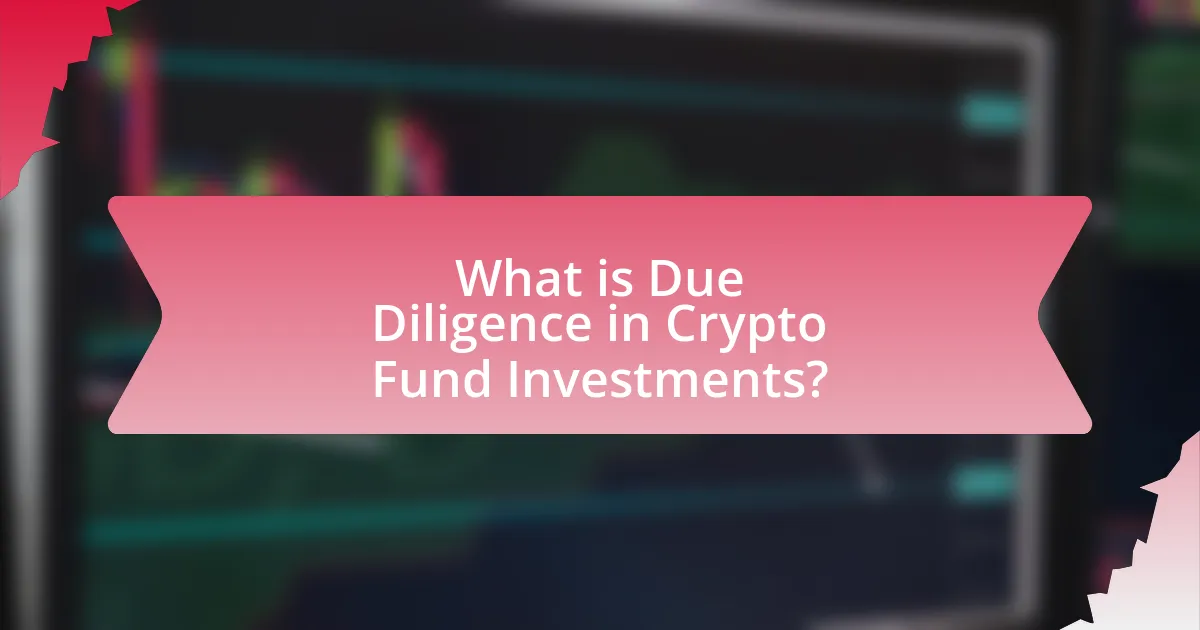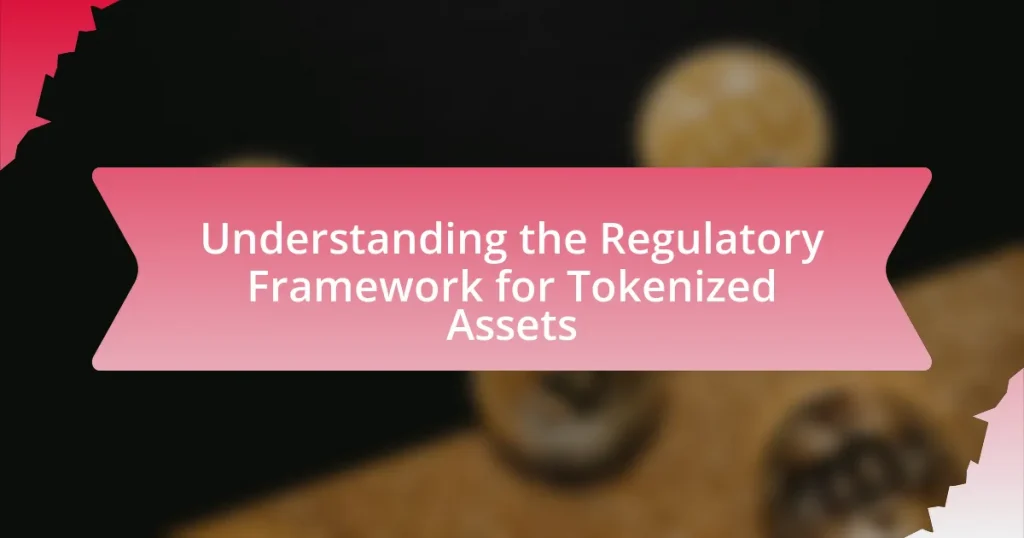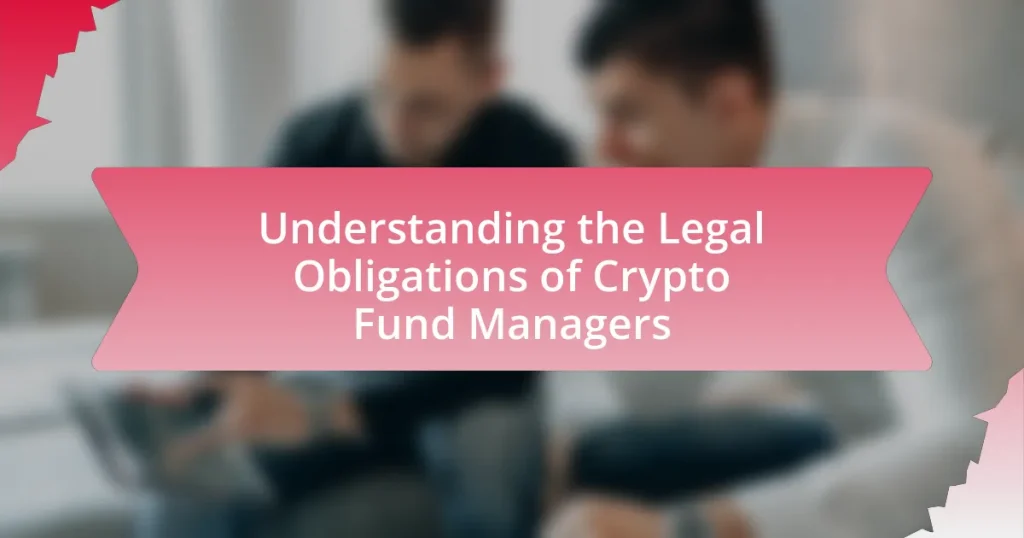Due diligence in crypto fund investments is a critical assessment process that investors use to evaluate the risks and opportunities associated with cryptocurrency funds. This article outlines the importance of due diligence, emphasizing its role in mitigating financial losses and protecting against fraud. Key components of due diligence include analyzing the fund’s investment strategy, management team, regulatory compliance, and financial metrics. The article also discusses common pitfalls investors face, best practices for conducting due diligence, and ongoing strategies for monitoring investments post-acquisition, highlighting the necessity of thorough research in the volatile crypto market.

What is Due Diligence in Crypto Fund Investments?
Due diligence in crypto fund investments refers to the comprehensive assessment and evaluation process that investors undertake to understand the risks and opportunities associated with a cryptocurrency fund. This process typically involves analyzing the fund’s investment strategy, management team, regulatory compliance, and the underlying assets in which the fund invests. According to a report by the CFA Institute, effective due diligence can significantly mitigate risks, as it allows investors to make informed decisions based on thorough research and analysis of the fund’s performance history and market conditions.
Why is Due Diligence Crucial for Investors in Crypto Funds?
Due diligence is crucial for investors in crypto funds because it helps assess the risks and potential returns associated with these investments. The cryptocurrency market is highly volatile and often lacks regulatory oversight, making thorough research essential to identify credible funds and their management teams. According to a report by the Financial Action Task Force (FATF), inadequate due diligence can lead to significant financial losses, as evidenced by the collapse of several crypto funds due to fraud or mismanagement. Therefore, conducting due diligence enables investors to make informed decisions, mitigate risks, and enhance the likelihood of achieving favorable investment outcomes.
What are the potential risks of neglecting Due Diligence?
Neglecting due diligence in crypto fund investments can lead to significant financial losses and legal repercussions. Without thorough investigation, investors may unknowingly engage with fraudulent schemes or poorly managed funds, resulting in the loss of their capital. For instance, the collapse of the cryptocurrency exchange Mt. Gox in 2014, which resulted in the loss of approximately $450 million, highlights the dangers of inadequate due diligence. Additionally, failing to assess regulatory compliance can expose investors to legal liabilities, as seen in cases where funds were penalized for operating without proper licenses. Thus, the risks of neglecting due diligence include financial loss, legal issues, and potential damage to reputation.
How does Due Diligence protect investors from fraud?
Due diligence protects investors from fraud by thoroughly assessing the legitimacy and financial health of investment opportunities. This process involves verifying information about the investment, including the background of the fund managers, the structure of the investment, and the regulatory compliance of the fund. For instance, a study by the CFA Institute highlights that rigorous due diligence can reduce the risk of fraud by identifying red flags such as inconsistent financial statements or lack of transparency. By conducting due diligence, investors can make informed decisions, thereby minimizing their exposure to fraudulent schemes.
What are the key components of Due Diligence in Crypto Fund Investments?
The key components of Due Diligence in Crypto Fund Investments include assessing the fund’s investment strategy, evaluating the management team, analyzing the fund’s performance history, reviewing compliance and regulatory adherence, and conducting risk assessments. Each component plays a crucial role in ensuring that investors understand the potential risks and rewards associated with the investment. For instance, evaluating the management team involves examining their experience and track record in the cryptocurrency space, which is essential for gauging their ability to navigate market volatility. Additionally, reviewing compliance ensures that the fund adheres to legal standards, which is vital in an industry often scrutinized for regulatory issues.
What financial metrics should investors analyze?
Investors should analyze key financial metrics such as return on investment (ROI), net asset value (NAV), expense ratio, and liquidity. ROI measures the profitability of an investment relative to its cost, providing insight into potential gains. NAV represents the total value of a fund’s assets minus its liabilities, indicating the fund’s overall worth. The expense ratio reflects the costs associated with managing the fund, which can impact net returns. Liquidity assesses how easily an asset can be converted into cash without affecting its price, crucial for understanding investment flexibility. These metrics are essential for informed decision-making in crypto fund investments.
How do regulatory compliance and legal considerations factor into Due Diligence?
Regulatory compliance and legal considerations are critical components of due diligence, particularly in the context of crypto fund investments. They ensure that the investment adheres to applicable laws and regulations, thereby mitigating risks associated with legal liabilities and financial penalties. For instance, compliance with the Financial Action Task Force (FATF) guidelines is essential for crypto funds to prevent money laundering and terrorist financing. Additionally, legal considerations involve assessing the fund’s structure, contractual obligations, and the regulatory environment in which it operates, which can significantly impact the fund’s viability and investor protection. Failure to address these factors can lead to severe repercussions, including sanctions or loss of investor confidence, underscoring the necessity of thorough due diligence in the crypto investment landscape.
What processes are involved in conducting Due Diligence for Crypto Funds?
The processes involved in conducting Due Diligence for Crypto Funds include assessing the fund’s investment strategy, evaluating the fund manager’s background, analyzing the fund’s financial statements, and reviewing compliance with regulatory requirements. Assessing the investment strategy involves understanding the types of cryptocurrencies and assets the fund invests in, which helps gauge risk and potential returns. Evaluating the fund manager’s background requires examining their experience, track record, and reputation in the crypto space, as this can significantly impact fund performance. Analyzing financial statements entails reviewing past performance metrics, fees, and expenses to ensure transparency and accountability. Finally, reviewing compliance with regulatory requirements ensures that the fund adheres to legal standards, which is crucial for mitigating risks associated with fraud and mismanagement.
How can investors assess the management team of a crypto fund?
Investors can assess the management team of a crypto fund by evaluating their experience, track record, and expertise in the cryptocurrency space. A strong management team typically has a history of successful investments, relevant industry experience, and a clear understanding of blockchain technology and market dynamics. For instance, a team with members who have previously managed successful crypto projects or funds demonstrates credibility and capability. Additionally, investors should review the team’s educational backgrounds, professional networks, and any past regulatory compliance issues, as these factors contribute to the overall trustworthiness and competence of the management team.
What tools and resources are available for effective Due Diligence?
Effective due diligence in crypto fund investments can be conducted using tools and resources such as blockchain analysis platforms, legal databases, and financial modeling software. Blockchain analysis platforms like Chainalysis and Elliptic provide insights into transaction histories and wallet behaviors, helping investors assess the legitimacy of crypto assets. Legal databases, such as Westlaw and LexisNexis, offer access to regulatory information and case law relevant to cryptocurrency, ensuring compliance and risk assessment. Financial modeling software, including Excel and specialized crypto investment tools, allows for detailed financial analysis and projections, aiding in the evaluation of potential investments. These resources collectively enhance the thoroughness and accuracy of the due diligence process in the rapidly evolving crypto landscape.
How does Due Diligence impact investment decisions in the crypto space?
Due diligence significantly impacts investment decisions in the crypto space by enabling investors to assess the risks and potential returns associated with a cryptocurrency or blockchain project. This process involves thorough analysis of the project’s whitepaper, team credentials, market position, and regulatory compliance, which helps investors make informed choices. For instance, a study by the Cambridge Centre for Alternative Finance found that 70% of crypto investors who conducted due diligence reported higher satisfaction with their investment outcomes, highlighting the correlation between diligent research and successful investments.
What role does Due Diligence play in portfolio diversification?
Due diligence plays a critical role in portfolio diversification by enabling investors to assess the risk and potential return of various assets before inclusion in their portfolios. This process involves thorough research and analysis of investment opportunities, which helps identify assets that can mitigate risk through diversification. For instance, a study by the CFA Institute highlights that effective due diligence can lead to better-informed investment decisions, ultimately enhancing portfolio performance by balancing risk across different asset classes. By systematically evaluating factors such as market conditions, asset correlations, and individual investment characteristics, due diligence ensures that a diversified portfolio is constructed with a clear understanding of the underlying risks and opportunities.
How can Due Diligence influence the timing of investments?
Due diligence can significantly influence the timing of investments by ensuring that investors have a comprehensive understanding of the risks and opportunities associated with a potential investment. This thorough analysis allows investors to make informed decisions, potentially leading to more favorable entry points in the market. For instance, a detailed due diligence process can reveal critical information about a crypto fund’s performance history, regulatory compliance, and market conditions, which can help investors avoid investing during market peaks or downturns. Consequently, timely and informed investment decisions, supported by due diligence, can enhance the likelihood of achieving better returns and mitigating risks.
What are common pitfalls in Due Diligence for Crypto Fund Investments?
Common pitfalls in due diligence for crypto fund investments include inadequate assessment of regulatory compliance, failure to evaluate the security of digital assets, and overlooking the fund’s operational transparency. Inadequate regulatory compliance assessment can lead to legal repercussions, as many jurisdictions have specific regulations governing cryptocurrency investments. For instance, the SEC has enforced actions against funds that did not comply with securities laws. Failure to evaluate the security of digital assets can result in significant financial losses, as evidenced by high-profile hacks, such as the $450 million theft from Mt. Gox in 2014. Lastly, overlooking operational transparency can hinder investors’ ability to assess the fund’s performance and risk, which is critical given the volatile nature of cryptocurrencies.
What mistakes do investors often make during the Due Diligence process?
Investors often make several critical mistakes during the Due Diligence process, including insufficient research on the investment’s fundamentals, overlooking regulatory compliance, and failing to assess the management team’s experience. Insufficient research can lead to a lack of understanding of the asset’s value and risks, which is essential for informed decision-making. Overlooking regulatory compliance can expose investors to legal risks and potential losses, as non-compliance may result in penalties or the inability to operate. Additionally, failing to assess the management team’s experience can result in investing in poorly managed funds, which historically have underperformed compared to well-managed counterparts. These mistakes can significantly impact investment outcomes, highlighting the necessity for thorough and comprehensive Due Diligence in crypto fund investments.
How can investors avoid over-reliance on third-party reports?
Investors can avoid over-reliance on third-party reports by conducting their own thorough research and analysis. This involves evaluating primary data sources, such as financial statements, market trends, and direct communications with fund managers. Additionally, investors should diversify their information sources by consulting multiple reports and expert opinions to gain a well-rounded perspective. According to a study by CFA Institute, independent analysis enhances decision-making and reduces the risk of misinformation, highlighting the importance of due diligence in investment strategies.
What best practices should investors follow for effective Due Diligence?
Investors should follow a structured approach to Due Diligence by conducting thorough research, verifying information, and assessing risks. This includes analyzing the financial statements of the crypto fund, understanding the fund’s investment strategy, and evaluating the management team’s experience and track record. According to a report by the CFA Institute, 70% of investment failures can be attributed to inadequate Due Diligence, highlighting the necessity of a comprehensive evaluation process. Additionally, investors should utilize third-party audits and legal reviews to ensure compliance and transparency, further reinforcing the integrity of their investment decisions.
How can investors create a Due Diligence checklist for crypto funds?
Investors can create a Due Diligence checklist for crypto funds by focusing on key areas such as fund structure, management team, investment strategy, compliance, and performance metrics. First, they should evaluate the fund’s legal structure and registration status to ensure it complies with relevant regulations. Next, assessing the management team’s experience and track record in cryptocurrency investments is crucial, as this directly impacts the fund’s potential success.
Additionally, investors should analyze the fund’s investment strategy, including asset allocation and risk management practices, to understand how the fund plans to achieve its objectives. Compliance with anti-money laundering (AML) and know-your-customer (KYC) regulations is also essential, as it mitigates legal risks. Finally, reviewing historical performance metrics, including returns and volatility, provides insight into the fund’s past behavior and helps investors gauge future performance potential.
By systematically addressing these areas, investors can develop a comprehensive Due Diligence checklist that enhances their understanding and assessment of crypto funds.
What ongoing Due Diligence strategies should investors implement post-investment?
Investors should implement continuous monitoring of financial performance, compliance checks, and risk assessments as ongoing due diligence strategies post-investment. Continuous monitoring involves regularly reviewing financial statements and operational metrics to ensure the investment is performing as expected. Compliance checks ensure that the investment adheres to regulatory requirements, which is crucial in the rapidly evolving crypto landscape. Risk assessments involve evaluating market conditions, technological changes, and potential threats to the investment, allowing investors to make informed decisions. These strategies are supported by the fact that the crypto market is highly volatile and subject to regulatory changes, making ongoing due diligence essential for safeguarding investments.















